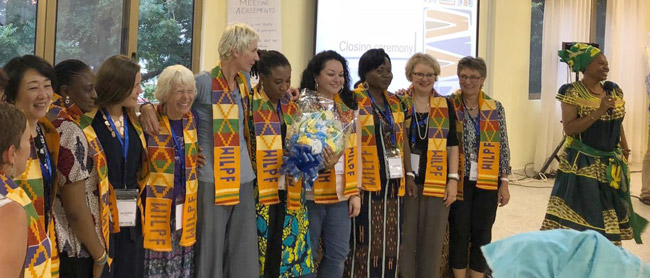Melissa Torres Elected Vice President to the WILPF International Board
Published on October, 10 2018Well-wishers hug Melissa Torres after her election as an International Vice President for WILPF at the Congress in Ghana. Photo credit: Jan Corderman.
By Jan Corderman and Dixie Hairston
When the election results were announced on the final day of our International Congress held at the University of Accra in Ghana in August 2018, Melissa Torres, the US Section’s International Board Member, was instantly surrounded by delegates from around the world who wanted to personally wish her well in her new role as an International Vice President.
Among her goals, Melissa “aims to increase diversity and inclusion” and to continue in her role as mentor, a role she found through her membership in WILPF and that she continues to perfect through her work with the annual Practicum and Local2Global program at the United Nations Commission on the Status of Women.
Dr. Torres has been a member of WILPF US since 2011 when she was selected as a Delegate to the Commission on the Status of Women through the Practicum in Advocacy Program at the United Nations. In 2013, she was selected as a Delegate for the US to the LIMPAL Americas Meetings where she met and networked with WILPF/LIMPAL representatives from throughout the Americas.
A year later, Dr. Torres was selected as a WILPF US Emerging Leader by the US Board. She attended a mentoring and strategizing retreat with WILPF leadership and also participated in the successful efforts to restart the Houston branch. Her proposal for the US Section’s first committee and prioritization of Immigration and Border Militarization proved successful and resulted in a partnership with the Mexican Section. The focus of this partnership was on the US-Mexico border and an ever-growing US defense budget which funds the militarization, inhumane practices, and, in her words, “the over-policing of Latinx bodies on both sides of the border.” The Houston Branch continues to serve as the seat of the Immigration Committee.
At the Centennial Conference in 2015, Dr. Torres co-presented with the Mexican Section on the need for WILPF Sections to partner with neighboring sections on border policies affecting both populations. She was a Delegate to the Universal Periodic Review (UPR) of the United States and has worked with the WILPF International Human Rights Programme to address several of the recommendations she made in her testimony there. She continues to work with WILPF International and its Human Rights Programme for the upcoming UPR meetings, as well as following up on the assistance she offered to WILPF International’s contribution to the Office of the United Nations High Commissioner for Human Rights (OHCHR) Special Rapporteur on Extreme Poverty and Human Rights.
Dr. Torres is of Mexican descent, was born on the US-Mexico border, and raised between both countries. Her focus (both in and out of WILPF) is the protection of displaced Latinxs in the Americas. She is a research scientist (she holds a PhD in Social Work), and currently works at the University of Texas at Austin as the Director of Human Trafficking Research at the Bureau of Business Research. She founded the Latin American Initiative at the University of Houston Graduate College of Social Work, which connects Spanish-speaking students to universities and human rights agencies in Latin America. Dr. Torres is also highly involved with the American Red Cross, serving as the Deputy Director of Latino Engagement and Outreach, and is a volunteer with the International Federation of the Red Cross, which has observer status with the United Nations.

Photo credit: Jan Corderman.
Dr. Torres submitted the following upon her nomination to the International Board:
“My goals as a WILPF member, and the reason I have stayed committed to WILPF for so long, is to highlight intersectionality. I aim to increase diversity and inclusion – namely the voices and work of young womxn of color – and creating space for their mentorship and eventual leadership, just as was done with me by a previous WILPF U.S. president. Part of that goal is bringing to the table issues that matter to young womxn of color – like immigration and border issues, reproductive justice, and fair labor practices (which includes military practices) – all of which are strongly tied to the U.S. military and defense budget in many ways. These are the same goals I would keep as Vice President, if elected.
My more focused and personal goal for the role would be to raise the majority voices of the Americas – namely the Spanish-speaking population – and work with and on uniting us on the continent, as our work and our people are all interconnected. I would prioritize meetings – both virtual and in-person – with and between sections and hope to fundraise and work on a follow up conference for the Americas/Spanish-speaking sections as the 2013 meeting proved helpful in finding and forming young leadership and prioritizing the need for our issues.”
For more information, contact: Jan Corderman at jancorderman@msn.com.



